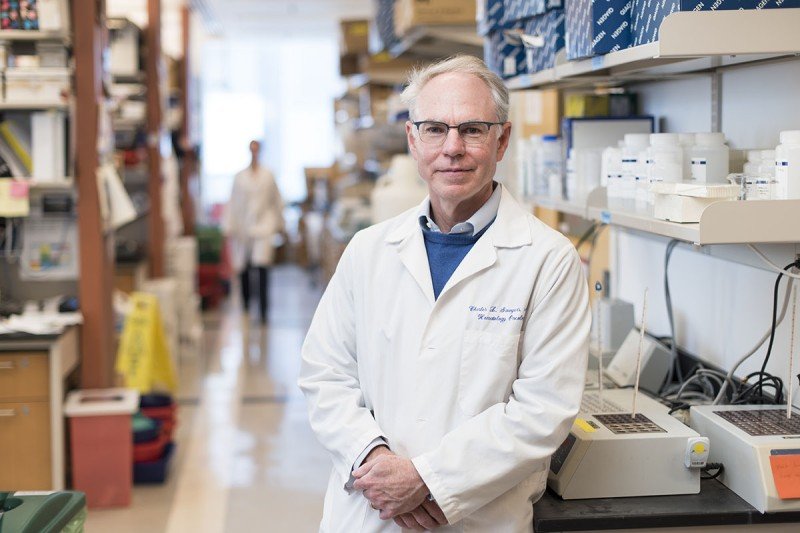
Charles Sawyers played a pivotal role in the development of Gleevec® (imatinib), a game-changing cancer drug.
The outlook used to be bleak for patients diagnosed with chronic myeloid leukemia (CML). But everything changed when the drug Gleevec® (imatinib) was developed 20 years ago and became a “silver bullet,” able to send CML into remission for years. Gleevec has saved millions of lives and paved the way for how we treat cancer with targeted drugs.
Charles Sawyers, a hematologic oncologist at Memorial Sloan Kettering Cancer Center, worked with a team of scientists to invent, test, and push Gleevec to market. Now, 20 years after Gleevec’s astonishing success, medical oncologist Diane Reidy-Lagunes, the host of Cancer Straight Talk from MSK, a podcast for people with cancer and their loved ones, sat down with Dr. Sawyers to discuss the future of drug development.
Host Diane Reidy-Lagunes talks with Dr. Sawyers about what’s next in the field of cancer pharmaceuticals. Is another silver bullet on the horizon?
The Silver Bullet: How It Happened
Before Gleevec, “a disease like CML was not on anyone’s radar” in the pharmaceutical world, Dr. Sawyers says. Today, Dr. Sawyers is Chair of the Human Oncology and Pathogenesis Program and Marie-Josée and Henry R. Kravis Chair at MSK. The two available treatments for CML at the time caused difficult side effects, weren’t consistently successful, or were only suitable for a small portion of patients. Gleevec, on the other hand, showed promise as a once-a-day pill with minimal side effects that could keep the cancer at bay for years.
Dr. Sawyers and others persuaded the pharmaceutical company Novartis to do a phase 1 clinical trial. “Once we got the right dose, it worked in everybody. It exceeded our wildest dreams,” Dr. Sawyers says. However, getting a phase 2 trial presented a new challenge and required advocacy from not just the researchers but also patients.
In the early days of the internet, patients spread the word of the success of Gleevec, and roughly 5,000 CML patients signed a petition that was sent to the then-CEO of Novartis.
“They stepped up to the plate, and Gleevec went from first dose in the first patient to approval in three years — which, at the time, I think was a record,” Dr. Sawyers says.
Precision Oncology Today
“Gleevec launched a revolution in how we do targeted therapies,” Dr. Sawyers says. “The real sort of breakthrough actually happened here amongst our colleagues at MSK, and that was the recognition that a certain percentage of patients with lung cancer would have dramatic responses with one of these targeted therapies: a drug sometimes known as Tarceva®,” Dr. Sawyers explains.
These kinds of discoveries guide the development of the next set of drugs — “an incredible arsenal of strategies to go after cancer,” says Dr. Sawyers. They include immune checkpoint inhibitors. These drugs have “revolutionized the way we now, instead of treating the tumor itself, treat the cells surrounding the tumor,” Dr. Sawyers says.
What’s Next
A major focus in research is combating drug resistance. As part of the 21st Century Cures Act, Dr. Sawyers was involved in Cancer Moonshot, a seven-year effort to accelerate progress in cancer research. “[Drug resistance] is clearly a major, major issue. Hopefully, the Congress will re-up on this because we’re coming to the very end of the seven years,” Dr. Sawyers says.
There are two other areas of cancer research that Dr. Sawyers finds most promising. The first is genetic testing to achieve more accurate diagnoses. “We can do these gene tests on a blood test. This is like total science fiction,” Dr. Sawyers says. The second is identifying a list of genes that cause cancer, known as drivers. “We have drugs against some of those drivers, but not all because they’re in categories that we call undruggable. But we’re making headway in making them druggable. There’s real progress happening, and I’m excited,” Dr. Sawyers says.
To learn more about the future of cancer drugs and research from Dr. Charles Sawyers, tune in to this episode of Cancer Straight Talk from MSK.



